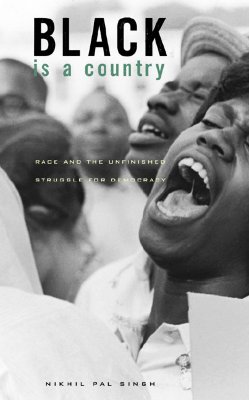Nationalism within the Colonized State: Resistance Movements and the Politics of Borders
by Ezekiel Fry
 In his book, Black is a Country: Race and the Unfinished Struggle for Democracy, Nikhil Pal Singh draws up the example of the Black Panthers’ solidarity and unity with the Viet-Cong. This solidarity illuminates a feeling on both fronts of existing in a colonized state. The Panthers view Oakland very much in the same way that the Viet-Cong might view Hanoi. These are spaces within a larger colonial nation where the oppressed and the colonized create their own sovereignty. Despite the pressure of French occupation, Ho Chi Minh and his comrades declared Hanoi to be the seat of their revolution in the 1940’s and 1950’s, much in the same way that even with the ever-present police violence and threat, the Panthers declared their revolution in the occupied streets of Oakland in the 1960’s and 1970’s. The problems that this presents for the occupying state should be self-explanatory in hindsight. The Viet-Cong’s declarations of sovereignty resulted in immediate battle with first the French and then American forces, and the Panthers’ declaration resulted in their systematic destruction by the United States government. The threat was clearly tangible. Both organizations had struck upon a way to unravel and disrupt the colonial sovereignty and power of the oppressive occupiers. They forced a move from colonial government through their actions.
In his book, Black is a Country: Race and the Unfinished Struggle for Democracy, Nikhil Pal Singh draws up the example of the Black Panthers’ solidarity and unity with the Viet-Cong. This solidarity illuminates a feeling on both fronts of existing in a colonized state. The Panthers view Oakland very much in the same way that the Viet-Cong might view Hanoi. These are spaces within a larger colonial nation where the oppressed and the colonized create their own sovereignty. Despite the pressure of French occupation, Ho Chi Minh and his comrades declared Hanoi to be the seat of their revolution in the 1940’s and 1950’s, much in the same way that even with the ever-present police violence and threat, the Panthers declared their revolution in the occupied streets of Oakland in the 1960’s and 1970’s. The problems that this presents for the occupying state should be self-explanatory in hindsight. The Viet-Cong’s declarations of sovereignty resulted in immediate battle with first the French and then American forces, and the Panthers’ declaration resulted in their systematic destruction by the United States government. The threat was clearly tangible. Both organizations had struck upon a way to unravel and disrupt the colonial sovereignty and power of the oppressive occupiers. They forced a move from colonial government through their actions.
Unfortunately the results of the Panthers non-violent and community based declaration was not successful in the way that the Viet-Cong’s ultimately was (although this success could probably now be rethought due to the adoption of a global capitalist model by pretty much all the former communist states in Asia). The oppressive regime never left Oakland; it is occupied to this day. However, these models, and particularly the Panthers’ approach, can serve as templates and inspiration for organizing effectively outside of the state’s parameters. Another key aspect of both of these projects is that the groups declaring their own sovereignty where racialized. This is both an important factor for the assessment of the level of threat it posed to the racist state apparatus, and also is important as the place, the very site, of the resistance. That which was used to subdue and control is turned around into something that becomes a powerful way of resisting colonizing forces. Black nationalism becomes a decolonizing force against the very system that created blackness as a way of racializing and compartmentalizing. There is much to learn from this redefining of positions of struggle and repositioning and reclaiming. That we might find a spot to resist oppression in the very language used to control is heartening. But I do not want to get too carried away.
Resistance movements such as Occupy failed to fully take into account ideas of race. It became something of a young, white, middle-class uprising. While this is certainly important, Occupy’s failure to look deeper than the 99% and establish important roles for difference ultimately weakened the impact of their movement (the middle class has to be involved in change from my perspective, it has to be forced into changing, it has to experience similar feelings of isolation and discouragement that poor communities feel in order to become active. Folks don’t really change because they want to, they change because they need to.).
The ideas of race and class are inseparable. When we speak of class we speak of race, and when we speak of race we speak of class. This is perhaps the best example I have yet to come up with for the concept of articulation. They are always working in relation to one another. In this case, any resistance movement that claims to be a class struggle, that does not already discuss race as a primary point in this debate, is not doing their homework, nor opening up truly effective channels for change and upheaval. When we talk about the one, we need to already be talking about the other. Like the Panthers and the Viet-Cong we should think about how we can mobilize these articulated principles in our communities in an increased effort to resist state-sanctioned forms of liberal change and progress. Imagine new ways!